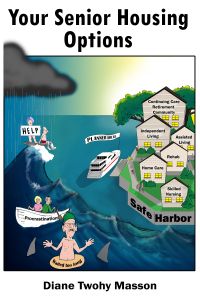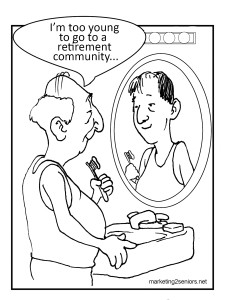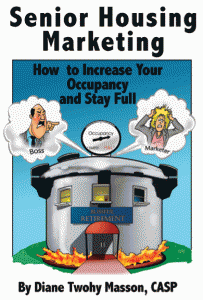Marketing 2 Seniors | The Blog
with Author: Diane Masson
Summary Video of “Your Senior Housing Options!”
Here’s a quick summary of “Your Senior Housing Options,” including the costs and consequences from tips2seniors.com. It walks you through a dementia scenario including all the choices for a vulnerable senior. This video can empower an independent senior to plan ahead or help an adult child put their parent in a quality senior community.
Wanted: Seniors with Moderate Alzheimer’s for a Clinical Trial
 Do you know a senior(s) who has mild to moderate Alzheimer’s? This article will share what a clinical trial is testing and how far along in the Alzheimer’s disease a senior can be to remain eligible to participate. There are about 60 study sites located around metropolitan areas in the United States.
Do you know a senior(s) who has mild to moderate Alzheimer’s? This article will share what a clinical trial is testing and how far along in the Alzheimer’s disease a senior can be to remain eligible to participate. There are about 60 study sites located around metropolitan areas in the United States.
Nourish Ad clinical research study is testing an investigational treatment for Alzheimer’s disease and memory loss. “Investigational” means that this treatment is currently being tested and isn’t approved or available for use by the public. The investigational drug is called AC-1204. It is a double-blind study to improve thinking processes for people with Alzheimer’s disease. If a senior volunteers for this study, they either get the drug AC-1204 or not. Learn more about the company, the drug and eligibility for the trial HERE.
My mother-in-law, Amy, has Alzheimer’s and I hope we can figure out this disease in her lifetime.
I am not a doctor, but my simplified version of this trial is as follows: Seniors’ brains work on glucose. Seniors with Alzheimer’s brains do not process glucose normally. This trial will give a senior with Alzheimer’s a daily drink that provides an alternative energy source for the brain to improve memory.
A total of 480 seniors can qualify for this 6-month study. Senior participants must be 66 to 90 years old with mild to moderate Alzheimer’s or memory loss. The senior must have a permanent caregiver or family member participate in the study as well.
The study is designed to look at the safety and effectiveness of AC-1204. If a senior completes the first part of the study, he or she will have the option to continue AC-1204 for 6 more months at no additional cost.
There may be risks for participating in any clinical trial. Consider the risks and benefits before involving your loved one. Clinical studies are required by the FDA (Food and Drug Administration) prior to the release of a drug to the general public. Not all investigational drugs are approved by the FDA.
Learn more about the NOURISH AD study at ClinicalTrials.gov
For managers/administrators of assisted living and memory care communities: If your community resides by one of the metropolitan study sites, a local doctor who is overseeing the research study could put on a presentation for your staff/caregivers or possible participants. Call Laura for more information at: 303.999.3742.
Diane Masson is a senior living expert who has authored two 5-star rated books. “Your Senior Housing Options,” empowers seniors to plan ahead and make their own decisions for the future, instead of waiting for a health care crisis and having family members put them someplace. The second book was written for senior living professionals called, “Senior Housing Marketing – How To Increase Your Occupancy and Stay Full.” Reach out to her through her website: Tips2Seniors.com and read the weekly blog.
Sexually Aggressive in Memory Care?!!?
 How do you keep your mom or dad safe in a memory care community or assisted living? A retired cop moved into my mother-in-law’s memory care community and has been demonstrating sexual and violent aggression against her, other residents, and staff. This is what my family is facing now. Read about the incidents in, “Violence in Memory Care,” HERE.
How do you keep your mom or dad safe in a memory care community or assisted living? A retired cop moved into my mother-in-law’s memory care community and has been demonstrating sexual and violent aggression against her, other residents, and staff. This is what my family is facing now. Read about the incidents in, “Violence in Memory Care,” HERE.
This is a list of whom we have emphatically voiced our concerns:
- Caregivers
- The nurse
- The Administrator
- Two ombudsmen
- The State of Washington (surveyors of licensed assisted living)
- Adult Protective Services
Our family requested a care conference to discuss the safety of my mother-in-law, Amy. Two ombudsmen, the administrator, three adult children and myself attended it. It was the worst care conference that I have ever experienced in my 17 years working as a professional in senior living. On a personal level, I have attended numerous care conferences for nine years as an advocate for my own mother who had dementia. There is always a conclusion at the end of the care conference that provides some sense of hope for improving care or concerns.
Why was this care conference so bad?
The administrator would only talk about Amy. She refused to discuss Amy’s safety in regards to the aggressive cop, because of HIPPA. She refused to share any measures or policies that the staff was following for Amy’s safety. Are you kidding me? I specifically asked, “What are you doing to protect her?” She said that she could not answer that question and kept talking in circles.
The ombudsmen were no help either. They said they could only discuss Amy because we gave them permission to do so. They could not discuss any other residents or the aggressive retired cop because they had not been given permission to do so. Nobody would address the elephant in the room, which was an aggressive retired cop with dementia preying on vulnerable residents.
What about Amy’s safety? What about the other residents’ safety?
The state did a surprise visit to the memory care community last week and said there are no new violations. This community is in a rural part of Washington State. There is not another community in the local area.
Any advice from senior living professionals? What else can we do?
Tip: For adult children looking for memory care or assisted living. Interview the administrator, before you move your parent into the community. Find out how long they have worked there. We did this and the answer was two years. Life was good for Amy until this experienced administrator moved on.
Diane Masson is a senior living expert who has authored two 5-star rated books. Her new book is an all-encompassing answer guide for seniors called, “Your Senior Housing Options,” designed to help seniors navigate choices quickly. The second book was written for senior living professionals called, “Senior Housing Marketing – How To Increase Your Occupancy and Stay Full.” Reach out to her through her website: Tips2Seniors.com and read the weekly blog.
Learn how to have “The Talk,” with a senior, from author Diane Masson
Did you share a holiday dinner with a struggling senior? Have the basics become difficult for your senior parent? Is there a little dementia? Learn how to have “The Talk,” with a senior from author Diane Masson.
Happy holidays from Diane Masson and Tips2Seniors.com
Violence in Memory Care
 A former cop moved into my mother-in-law’s memory care community. He was doing simulated punches to people including the administrator. The administrator was worried the punches might become real, because seniors with dementia do not have good depth perception. Then my sister-in-law witnessed him doing it to my mother-in-law, Amy. She was horrified.
A former cop moved into my mother-in-law’s memory care community. He was doing simulated punches to people including the administrator. The administrator was worried the punches might become real, because seniors with dementia do not have good depth perception. Then my sister-in-law witnessed him doing it to my mother-in-law, Amy. She was horrified.
My sister-in-law was sitting across from her mom. The former cop came up from behind my sister-in-law and then she saw a fist heading for Amy’s face. The fist stopped six inches away. Here is the weird part. A caregiver witnessed the whole thing, but showed no concern, never said a word, or redirected him. He did walk away and the caregiver accompanied him down the hall. My sister-in-law shouted, “That was not cool,” after them.
So the staff started locking residents’ rooms because they caught the former cop standing over sleeping residents. The doors were locked at night so residents could still wander out, but he could not wander in.
Something combative must have happened between the former cop and a staff person. They would not say what but my sister-in-law observed that he was gone over a day and then came back drugged. All these situations have transpired over two weeks.
My sister-in-law is very worried about Amy. What if she gets up in the night and leaves her room? What if the former cop is out too? Amy will have nowhere to go because every door is locked. A few days ago my sister-in-law discovered the doors to the residents rooms were locked during the day. She shared her disapproval with the administrator. The administrator said it was because both residents were asleep in the room (which they were doing at the time). My sister-in-law said to the administrator, “You said you would only lock the doors at night.”
Who is protecting the residents? The community says they cannot provide one-on-one care for the former cop. They say he has rights too and just can’t make him leave. If another violent incident happens he will be thrown in jail because there is a 49-day wait for a geripsych hospital.
One caregiver shared that the former cop pointed to himself and then her. Then he made gestures of sexual intercourse. He tried to grab her behind, but she wouldn’t let him. Other caregivers do let him grab their behinds and laugh. This is very concerning to our family, because how can someone with dementia distinguish who is a caregiver and who is a resident? He should always be redirected on proper behavior. He is not. There is no redirecting consistency with the caregiving staff.
When my sister-in-law shared the above examples with the administrator she said, “The caregivers are burned out and fearful of him. I am glad you told me and I will talk to staff about consistency.”
The family called the omsbudman and the state. The state triggered a call back to the family from adult protective services. They wanted to know if Amy was afraid. The answer was yes!
Recently, Amy was watching the fish swim in the 100-gallon tank. The former cop came up behind her and grabbed both of her arms. She screamed. My sister-in-law heard the story from a caregiver. Here was Amy’s interpretation to her daughter: Amy said, “A drunk guy grabbed me and tried to beat me up.” She pointed to the former cop and said, “There is that bad man, I don’t like him.”
Is the facility doing all that they can and should? Should this guy be gone? How much violence is okay in a licensed assisted living community in Washington State?
Any answers would be much appreciated.
Diane Masson is a senior living expert who has authored two 5-star rated books. Her new book is an all-encompassing answer guide for seniors called, “Your Senior Housing Options,” designed to help seniors navigate choices quickly. The second book was written for senior living professionals called, “Senior Housing Marketing – How To Increase Your Occupancy and Stay Full.” Reach out to her through her website: Tips2Seniors.com and read the weekly blog.
Musings of a Senior’s Fabulous Life
 Meet Betty, a senior resident, who was born in 1926 as a child of the depression. Her life was different back then and every family was very frugal. When she grew up and went to work, ladies wore dresses, hats and girdles. It was just the way of the world back in the thirties and forties.
Meet Betty, a senior resident, who was born in 1926 as a child of the depression. Her life was different back then and every family was very frugal. When she grew up and went to work, ladies wore dresses, hats and girdles. It was just the way of the world back in the thirties and forties.
According to Betty, the young people today have not experienced the depression nor the constant thought of frugalness. She said, “Your generation has a freedom that I never had. You have a choice of how to dress at work. It is more casual than in my day. Plus, I would never be able to keep up with the technology. I’m so impressed with the technology and all that you can get done in a short time span.” Betty admires what the workforce of today can accomplish.
As she walked into the exercise room at her Continuing Care Retirement Community (CCRC) with her walker, Betty said, “I can’t use all the fancy equipment in here, but I can keep walking. Even when I watch TV, I am walking in place and using my arms and staying active.” She proceeded to show off about four arm exercises that she utilizes. It was a very impressive demonstration.
Here’s the best quote from spending time with wonderful Betty: She said, “I can’t stop the years from slipping by. I am just so happy to say that I have had a fabulous life.”
What a delight during this time of the year to share a senior’s story. Betty is a senior who has been living at a CCRC for 10 years and is still fighting to stay active and keep her brain engaged and dementia-free.
Do you have a senior story to share? Maybe your senior story is a friend, neighbor, parent or resident at your senior living community? Please share in the comments…
Diane Masson is a senior living expert who has authored two 5-star rated books sold through Amazon. Her new book is an all-encompassing answer guide for seniors called, “Your Senior Housing Options,” designed to help seniors navigate choices quickly. The second book was written for senior living professionals called, “Senior Housing Marketing – How To Increase Your Occupancy and Stay Full.” Reach out to her through her website: Tips2Seniors.com and read the weekly blog.
7 Tips to have “The Talk” with a Senior
Last week the Tips2Seniors blog discussed: “Seniors in Denial, Relying on Friends and Family.” Every single one of us knows a senior who is struggling in their home. Some seniors silently suffer and others have a whole network of support from family and friends.
Ultimately when a loved one or neighbor tries to have “The Talk” with the senior it can have five typical results:
- Denial: “I am not ready yet. I am just fine living in my own home.”
- Shutting down: “I don’t want to discuss this.”
- Anger: “Why are you questioning my ability to be independent? Leave me alone.”
- Confusion: “Don’t you want to come see me everyday? I don’t understand.”
- Acceptance: “I understand that I have become a burden. Maybe it’s time to look at what my senior housing options could be. Will you help me look?”
In my 17-year senior housing career, sons, daughters and spouses have asked me the same question, how do I have “The Talk.”
Here are my 7 Tips to have “The Talk.”
- Set the stage for “The Talk”. You know if it is better to have “The Talk” in public or private with your senior.
- Public talk: Take them out to eat in a public location (so they can’t yell at you or they can’t escape into their bedroom).
- Private talk: Buy or make your seniors their favorite cookies. Serve the favorite cookies with their special coffee or tea at their dining room table.
- Tell your senior how much you love them.
- Then share your concerns, be very factual. Such as:
- You have fallen twice.
- You missed your medications three times this week.
- I come over here every day to help you.
- Explain your fears in loving detail. Every day when I call you my heart stops till you answer the phone on the third ring. I can’t handle the stress. It is making me sick with worry. I can’t keep this up. If something happens to me, you will be in jeopardy. (It is okay to cry and show your emotions. This is very emotional.)
- Recommend a solution to explore senior housing options together. I know you don’t want to move but it will be healthier for you and healthier for me. Let’s do this together.
- There is a book that can teach us how to find a great retirement community versus a mediocre one. Here’s the book, it is called, “Your Senior Housing Options.”
Depending on your senior, read it to them or you each read it on your own. Use the tips and advice in the book to find the best senior housing arrangement.
- Schedule a luncheon tour at a local retirement community that you have vetted with the tips from the book, “Your Senior Housing Options.”
If this article struck a cord with you, please share it on social media to help a friend or neighbor going through a struggle with a senior.
Give the gift of knowledge: “Your Senior Housing Options,” is an easy read with illustrations. It walks seniors and their adult children through the costs and pitfalls of navigating senior housing and includes the “7 Deadly Sins of Searching for Senior Housing Options.”
News Flash: Diane Masson’s interview on Generation Bold Radio broadcasted on Sunday, December 6th on the BizTalkRadio Network syndicated to 33 stations across the country.
Diane Masson is a senior living expert who has authored two 5-star rated books sold through Amazon. Her new book is an all-encompassing answer guide for seniors called, “Your Senior Housing Options,” designed to help seniors navigate choices quickly. The second book was written for senior living professionals called, “Senior Housing Marketing – How To Increase Your Occupancy and Stay Full.” Reach out to her through her website: Tips2Seniors.com and read the weekly blog.
Seniors in Denial, Relying on Friends and Family
Every single one of us knows a senior who is struggling in their home. Some seniors silently suffer and others have a whole network of support from family and friends.
- Daughters may call their mom once a day to inquire if her senior parent is okay OR no answer could mean they fell again and need help.
Result: Senior falls often lead to fractured hips, 911 calls, skilled nursing care with physically therapy and needing 24/7 care.
- A son may set his senior parent up with medications in a pillbox and then call two or three times a day to make sure his parent has taken them.
Result: This can be effective until the senior says, “What are these pills for? I don’t want to take them.” Most family members are not there in person twice a day to make sure the senior ingests the pills.
- Kind neighbors may make an extra plate of dinner every night and take it to their senior neighbor.
Result: Neighbors get frustrated and burned out, spending every single night away from their own family for one year or more. This type of support can’t go on and on.
- Daughters may spend every other Saturday cleaning mom’s house, grocery shopping and setting up her senior parent to survive for another two weeks.
Result: Even if the daughter lives two hours away, this type of help eventually turns into every Saturday. If the daughter works full time, it can never be daily help, then what?
What is the answer to a senior struggling to manage in their home?
Result: It’s time to talk turkey with a senior.
There are five typical results in having “The Talk” with a senior:
- Denial: “I am just fine living in my own home. I am not ready yet.”
- Shutting down: “I don’t want to discuss this.”
- Anger: “Why are you questioning my ability to be independent? Leave me alone.”
- Confusion: “Don’t you want to come see me everyday? I don’t understand.”
- Acceptance: “I understand that I have become a burden. Maybe it’s time to look at what my senior housing options could be. I am tired of being lonely. Will you help me look?”
In my 17-year senior housing career, my teams and I have helped thousands of seniors improve the quality of their life by making a planned move into an independent living, assisted living or Continuing Care Retirement Community. No one ever chooses memory care or skilled nursing, but those are options for many seniors (like my own in-laws) who waited too long and ended up in a health care crisis. Both my in-laws were hospitalized simultaneously in different hospitals and both their doctor’s told them they needed 24/7 care and could not return home. There was so much unnecessary suffering in my family and I don’t wish it on anyone. Such as my mother-in-law with dementia being given psychotropic medications (they don’t mix well). She has never been the same. Maybe my experiences can save you from a senior health care crisis?
Next week my blog will feature: 7 Tips to have “The Talk” with a Senior.
If this article struck a cord with you, please share it on social media to help others. If you have a friend or neighbor going through a struggle with a senior, let them know about next week’s blog.
Give the gift of knowledge: “Your Senior Housing Options” is an easy read with illustrations. It walks seniors and their adult children through the costs and pitfalls of navigating senior housing and includes the chapter on the “7 Deadly Sins of Searching for Senior Housing Options.”
News Flash: Diane Masson’s new interview on Generation Bold Radio will broadcast on Sunday, December 6th on the BizTalkRadio Network syndicated to 33 stations across the country.
Diane Masson is a senior living expert who has authored two 5-star rated books sold through Amazon. Her new book is an all-encompassing answer guide for seniors called, “Your Senior Housing Options,” designed to help seniors navigate choices quickly. The second book was written for senior living professionals called, Senior Housing Marketing – How To Increase Your Occupancy and Stay Full. Reach out to her through her website: Tips2Seniors.com and read the weekly blog.
Seniors Getting Squeezed
 What should this senior couple do? They sold their home that they could not manage any more and decided to move into an independent rental retirement community in Orange County, California. The couple has an income of $3,600 a month, but their monthly rent is $5,200. (The senior couple’s rent includes three meals a day, wellness classes, entertainment, housekeeping, transportation and etc.) So $1,600 is taken out of their savings for rent on a monthly basis, plus they still have to pay for telephone, Internet, hair styling, car bills, pharmaceuticals, insurances and possibly even gifts and travel.
What should this senior couple do? They sold their home that they could not manage any more and decided to move into an independent rental retirement community in Orange County, California. The couple has an income of $3,600 a month, but their monthly rent is $5,200. (The senior couple’s rent includes three meals a day, wellness classes, entertainment, housekeeping, transportation and etc.) So $1,600 is taken out of their savings for rent on a monthly basis, plus they still have to pay for telephone, Internet, hair styling, car bills, pharmaceuticals, insurances and possibly even gifts and travel.
This senior couple is just one example. Their plight is not uncommon. Thousands of seniors are concerned that their meager savings are eroding too quickly.
What happens when a senior needs assisted living? How will they afford it? What if one of them has a debilitating stroke and needs long-term skilled nursing? On a nationwide basis, it averages $80,000 a year.
Are you aware that board and care homes in Orange County California recently went up $1,000 to $1,500 a month because of the increase to minimum wage? Board and cares are the least expensive options for seniors needing assisted living type care. How will seniors afford the care now?
Social security is not increasing for seniors in 2016.
Costs for independent living, assisted living, memory care and Continuing Care Retirement Communities will continue to rise as food, utilities and minimum wage goes up. Most of these retirement communities are saddled with a 50 to 100 million mortgage. The residents will be making those interest payments too.
Here’s a tip: Ask what the history of the year-over-year monthly fee increases have been. What will it be in 2016? Some predictions are 5 – 8 percent increases? What have you heard?
It is getting tougher for seniors to make decisions and plan for their future.
Here’s another tip: Sometimes that one time investment at a Continuing Care Retirement Community ends up costing you less in the long run. Figure out the break-even point for you. Many offer you support if you outlive your resources. Ask lots of questions and do not rely on verbal promises of senior living sales people.
News Flash: Diane Masson’s new interview on Generation Bold Radio will broadcast on Sunday, December 6th on the BizTalkRadio Network syndicated to 33 stations across the country.
Diane Masson is a senior living expert who has authored two 5-star rated books sold through Amazon. Her new book is an all-encompassing answer guide for seniors called, “Your Senior Housing Options,” designed to help seniors navigate choices quickly. The second book was written for senior living professionals called, Senior Housing Marketing – How To Increase Your Occupancy and Stay Full. Reach out to her through her website: Tips2Seniors.com and read the weekly blog.
Is For-profit or Non-profit Better in Senior Housing?
 What’s better? What’s the senior housing spin?
What’s better? What’s the senior housing spin?
My mother moved into a not-for-profit Continuing Care Retirement Community. That’s where I started my senior housing career. I sold the not-for-profit status as better and more mission driven than the money grubby for-profits, because that was what all the not-for-profits said and did.
I was naive for three reasons, because later I learned:
- A non-profit board that did not understand seniors or senior housing made financial decisions for the entire senior living community.
- Most of the profits at the non-profit went towards other ministry work instead of being reinvesting back into the senior community.
- A resident was sexual abused by a non-profit staff member, even though every employee professed to be Christian.
Then my senior housing career switched to for-profit. It can be pretty dog-eat-dog aggressive at some companies. It really varies in the senior living industry if the resident is number one or the stockholders are the primary concern. So you better find out before you consider moving there or working there.
If a sales person can’t hit the required sales numbers, you are simply fired at some for-profits. Maybe that’s why so many sales people are impersonal and just want to know if you are ready now? If a senior is not ready now, the sales person has no interest in calling a senior back after they have toured. This is sad, because most seniors need to come back several times before making a decision to move. A relationship needs to be built.
At for-profit senior living communities, most financial decisions go towards the benefit of the stockholders. But there are some amazing administrators that love, adore and would walk on hot coals for their residents and staff. So resident centered communities can vary by location and not the owner in my opinion.
There are actually two types of for-profits: Those on the stock exchange and boutique communities that are run by families or attentive owners. I am lucky to work for a for-profit that is run by attentive owners. They have the heart of a not-for-profit and are completely resident centered and mission driven.
The communities I represent do something very unique for Continuing Care Retirement Communities. They offer a Guarantee of Care for life, if a resident outlives their resources. Every resident has the same offer, it is not limited to 5 or 10 residents on a good Samaritan fund or foundation.
Do you agree with my analogies or am I completely off base? How would you evaluate the differences?
Your Senior Housing Options,” has a simplistic title, but what’s inside this new book can save a you months of research time. Hear Diane Masson’s interview of how her mother and in-law’s faced the pivotal decision to plan ahead or wait until a crisis. Learn the pitfalls from transitioning from your home to senior housing. Understand what questions to ask, insider tips and dirty secrets revealed. For weekly tips join at: Www.Tips2Seniors.com
Diane Masson has worked in senior housing for 17 years and is the regional marketing director for two debt-free Continuing Care Retirement Communities in Southern CA (Freedom Village in Lake Forest and The Village in Hemet). Her first book “Senior Housing Marketing – How to Increase Your Occupancy and Stay Full,” is being utilized by senior housing professionals across the country. Both her first book and second book, “Your Senior Housing Options,” have a 5-star rating on Amazon.com.












